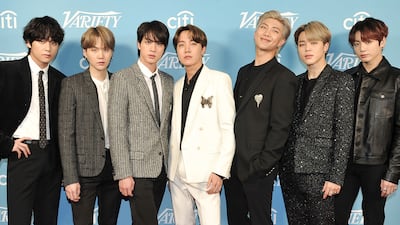Over the recent years, Korean shows like Squid Game and Crash Landing On You, and K-pop groups such as BTS and BlackPink have been at the forefront of a movement that's made Korean pop culture popular.
Koreans use the word "hallyu" to describe this phenomenon, which refers to the “Korean wave of entertainment” that has swept across Asia and now much of the world – and now this word, just one of a handful of Korean words, has been added to the Oxford English Dictionary.
Bulgogi, hanbok and kimchi are also some of the other additions to the OED in its latest update.
"We are all riding the crest of the Korean wave, and this can be felt not only in film, music or fashion, but also in our language, as evidenced by some of the words and phrases of Korean origin included in the latest update of the Oxford English Dictionary," said the OED.
A number of Korean food items have also been added, including bulgogi, thin slices of beef; dongchimi, a type of kimchi made with radish and containing napa cabbage; and banchan, the small sides dishes that are served with rice in Korean cuisine.
These are the new Korean words added to the OED:
- aegyo, n. and adj. – a cute display of affection
- banchan, n. – a small side dish of vegetables, etc, served along with rice as part of a typical Korean meal
- bulgogi, n. – a dish of thin slices of beef, which are marinated then grilled or stir-fried
- chimaek, n. – pairing of chicken and beer
- daebak, n., int., and adj. – expressing enthusiastic approval
- dongchimi, n. – a type of kimchi made with radish and typically also containing napa cabbage
- fighting, int. – expressing encouragement, incitement or support
- galbi, n. – a dish of beef short ribs, usually marinated in soy sauce, garlic and sugar, and sometimes cooked on a grill at the table
- hallyu, n. – the increase in international interest in South Korea and its popular culture
- hanbok, n. – traditional Korean costume worn by both men and women
- japchae, n. – a dish consisting of cellophane noodles made from sweet potato starch, stir-fried with vegetables and other ingredients, and typically seasoned with soy sauce and sesame oil
- K-, comb. form – combined with nouns relating to South Korea and its (popular) culture
- K-drama, n. – a television series in the Korean language and produced in South Korea
- kimbap, n. – a Korean dish consisting of cooked rice and other ingredients wrapped in a sheet of seaweed and cut into bite-sized slices
- Konglish, n. and adj. – English words that have been appropriated into Korean
- Korean wave, n. in Korean, adj. and n. – the rise of international interest in South Korea and its popular culture
- manhwa, n. – a Korean genre of cartoons and comic books, often influenced by Japanese manga
- mukbang, n. – a livestreamed video that features a person eating a large quantity of food and talking to the audience
- noona, n. – a boy’s or man’s elder sister
- oppa, n. – a girl’s or woman’s elder brother
- PC bang, n. – an establishment with multiple computer terminals providing access to the internet for a fee, usually for gaming
- samgyeopsal, n. – a Korean dish of thinly sliced meat, usually served raw to be cooked by the diner on a tabletop grill
- skinship, n. – touching or close physical contact between parent and child or between lovers or friends
- tang soo do, n. – a Korean martial art
- trot, n. – a genre of Korean popular music
- unni, n. – a girl’s or woman’s elder sister
"The adoption and development of these Korean words in English also demonstrate how lexical innovation is no longer confined to the traditional centres of English in the United Kingdom and the United States," said the OED.
"They show how Asians in different parts of the continent invent and exchange words within their own local contexts, then introduce these words to the rest of the English-speaking world, thus allowing the Korean wave to continue to ripple on the sea of English words."


